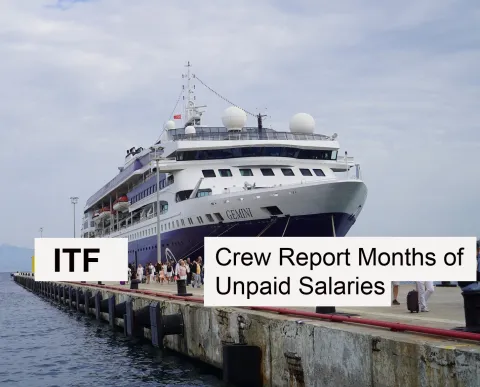
The following message was sent by a crew member wishing to remain anonymous. According to the crew member, many cruise lines abuse the mandatory time and attendance policy regulated under the Maritime Labour Convention 2006(‘MLC’). He states that supervisors onboard adjusts the crew time cards, especially for the minimum hours of rest, which must be at least 6 hours between the shifts.
"The crew onboard cruise ships today are nothing but modern slaves under a well-planned management shoreside as well as shipboard. As per ILO, u have to work 10 hours a day anything above that is overtime. During pre-public health inspections, the crew put more hours but they are pressured to sign out and work in their stations. If anyone doesn't agree then his or her appraisal is not above par, issued warnings, harassed in a professional manner there are enormous things happening in today's luxury cruise ships but nothing is highlighted as most of the crew fear a loss of job, promotion, etc. I have witnessed this on a large scale.
After 2006 time and attendance or time card was strictly implemented, before that there was nothing called time card u work 14 to 20 hours nothing was logged. After 2006 or most likely may 2007 time card policy was strictly implemented and team leaders who make daily rotation were trained by the shoreside office, how to split the time and work on it. Though it is mandatory and the International Labour Organisation does audit on it in some ships, but there are rules to bend and break it officially.
For example, u need to have a 10 hours rest period it can be 6+4 or 8 +2, etc in a day, during the high season and when public health audits or busy times go on it gets violated and then the next day the supervisor check it and get it corrected to save their ass. reason is the crew member is made to work extra hours and then time card is changed manually and sign taken from crew to avoid trouble, example if a crew member finishes at midnight at 12 and he has to report to duty at 5 am in the morning for breakfast preparation it is a rest of 5 hours in between to avoid this,some of them are made to sign in later after 6 am to avoid ILO violations,
It is simple common sense today the ships are getting bigger and bigger the ratio of crew are dropping guest/ crew ,new venues bars restaurants are loaded in ships how can they manage the time with so much stuff these are the ways how shipboard management play with the crew overtime if they don't it's simple no promotion, no good appraisal, mental harassment, etc.” says the crew member.
According to another crew member supervisors clock in and out instead of the crew. He says “I work on cruise ships and for many years I have witnessed abuse of the work hours all the time and the people who get the worst of this are the cooks who end up working 12-15h daily but only clock in 10 and even if they clock in more it is corrected and approved by the HR department on board. One of the cooks told me that his head of department asked him to give his own personal id and password to the clock in machine so that he would clock in instead of the crew member and he found out he wasn’t the only one most of the cooks didn’t do the clocking in them self’s. They were told "you just work, we will take care of this" which is against all laws. If he starts to complain it would only end badly for him. This is just one example but work hours are abused all over the cruise ships and its horrible, doesn’t matter which department they all get their fair share of un-clocked overtime in one way or another.”
According to Maritime Labour Convention 2006(‘MLC’) posted at Seafarers Rights Organisation, a seafarer has the right to regulated hours of work and hours of rest.
Hours of work are stated as either maximum hours of work, or minimum hours of rest:
the maximum hours of work must not exceed 14 hours in any 24-hour period and 72 hours in any seven-day period; or
the minimum hours of rest must not be less than 10 hours in any 24-hour period, and 77 hours in any seven-day period.
Hours of rest means time spent outside of work on account of the ship. It does not include short breaks.
Hours of rest may be divided into two periods, one of which must be at least 6 hours. The interval between periods of rest must not be longer than 14 hours.
Account must be taken of the danger posed by the fatigue of seafarers.
Any mandatory musters or drills must be conducted in a way that minimises disturbances of rest hours and does not induce fatigue.
A schedule/table of service at sea and service at port for all positions must be posted on the ship. It must be in the working language of the ship and in English.
A record of a seafarer’s daily hours of rest or hours of work must be kept on board in the working language of the ship and in English, and must be signed by the seafarer and the master or other authorized person. The seafarer must be given a copy.
In the event of an emergency or to give assistance to other ships or persons in distress at sea, the master can suspend the work schedule until the problem is resolved. If normal working hours are disrupted, a seafarer is entitled to an adequate compensatory rest period.
Are you a crew member? Do you have a story to share? You can send us an email here.
Crew Insights
Articles and experiences shared by crew members working on cruise ship. Find out more about ship life at sea together with tips and advices for first time crew members and cruise oldtimers.












